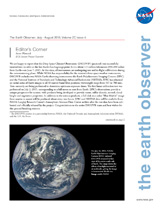The Earth Observer has a new look! Visit the NEW Earth Observer website.
The Earth Observer: Jul - Aug, 2015
In This Issue
Click title below to view page
- Editor’s Corner Front Cover
- Feature Articles
- NASA Sets the PACE for Advanced Studies of Earth’s Changing Climate4
- DEVELOP Project Uses Satellite Data to Help Control Malaria in Zanzibar13
- In Memoriam
- Angelita “Angie” Castro Kelly16
- Meeting/Workshop Summaries
- Geostationary Orbit as a New Venue for Earth Science Collaboration: Eleventh CEOS Atmospheric Composition Constellation Workshop17
- AIRS Science Team Meeting Summary23
- CERES Science Team Meeting Summary25
- Early Adopters Prepare the Way to Use ICESat-2 Data31
- In The News
- Satellites Enable Coral Reef Science Leap from Darwin to Online36
- Beijing Quadrupled in Size in a Decade, NASA Finds38
- Regular Features
- NASA Earth Science in the News 40
- NASA Science Mission Directorate – Science Education and Public Outreach Update 42
- Science Calendars 43
Editor’s Corner
Steve Platnick
EOS Senior Project Scientist
We are happy to report that the Deep Space Climate Observatory (DSCOVR1) spacecraft was successfully inserted into its orbit at the first Earth-Sun Lagrange point (L1)—about 1.5 million kilometers (930,000 miles) from Earth—on June 7, 2015. At this time, all instruments are undergoing test and in-flight calibrations during the commissioning phase. While NOAA has responsibility for the mission’s three space weather instruments, DSCOVR includes two NASA Earth-observing instruments: the Earth Polychromatic Imaging Camera (EPIC) and the National Institute of Standards and Technology Advanced Radiometer (NISTAR). EPIC has obtained...
Read more...

